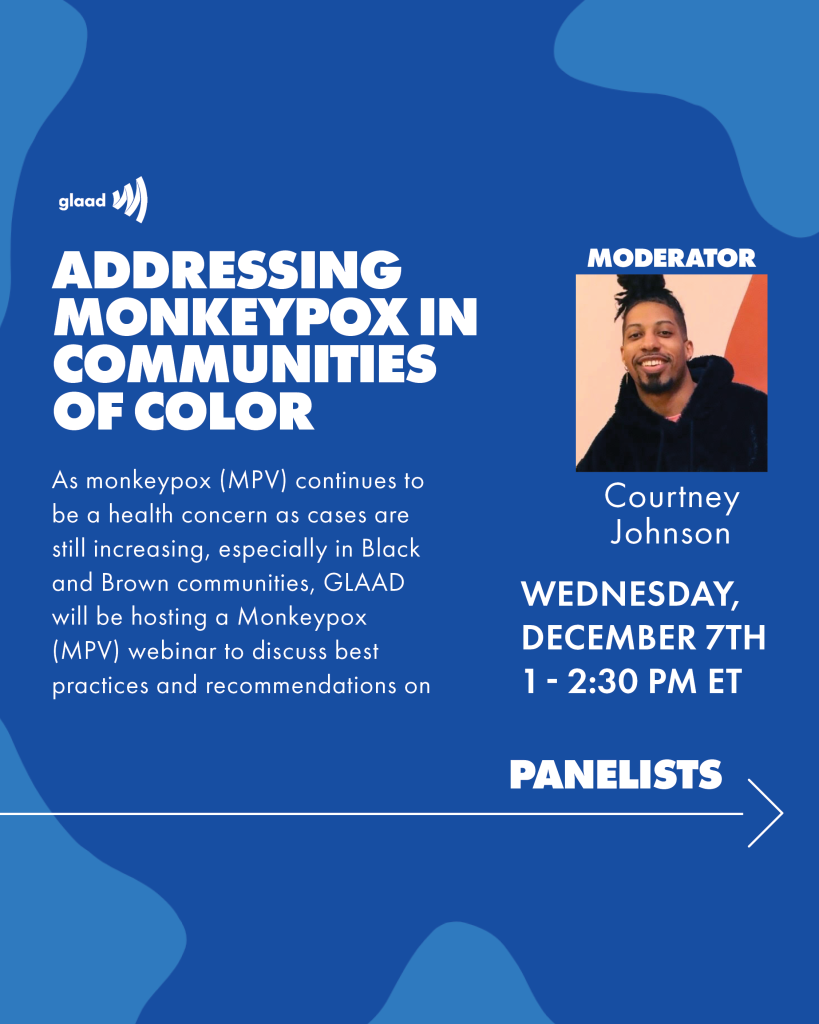By: Courtney Johnson, Communities of Color and Media Consultant and Mpox Subject Matter Expert
There are currently 29.792 confirmed cases of monkeypox virus (mpox) in the United States alone, with Black people making up 56% of the cases diagnosed between December 4 – December 22 alone. While the Black population accounts for 56% of mpox cases, Black people make up only 11% of the total 1,152,073 doses of the mpox vaccine that have been administered to date.
During the month of December, i sat down with Justin C. Smith, Director of the Campaign to End AIDS at Positive Impact, and Jennifer Barnes-Balenciaga, Director of the Crystal La’Beija Organizing Fellowship, for a webinar discussion about the impact of mpox in their cities and their efforts in combatting the impact of mpox in their communities. I also spoke with Dr. Adedotun Ogunbajo to discuss the social determinants that contribute to the poor uptake of vaccination and the high percentage of mpox cases in the Black population.
Jennifer Barnes-Balenciaga discussed her role as the co-investigator on the Respnd-Mi study, a community led survey of mpox symptoms and networks among queer and trans people in New York City. Barnes-Balenciage shared her role in placing trans people at the forefront of the conversation regarding mpox, as trans people were not originally prioritized during the intial outbreak.
Barnes-Balenciaga also expressed the need for medical providers to be proactive when focusing on the trans community, rather than simply using their stories and failing to addressing their concerns regarding issues surrounding mpox and their health.
“I would also like to see that legislators [do more] than just talking to trans people on Trans Day of Remembrance or Visibility, because we are [here] 365 [days a year], 364 if we are talking a leap year, and we do matter on all days,” she said.

During the webinar, Jennifer also spoke about how Black people faced added barriers of accessing mpox related healthcare in their own communities: “My fiancé came in onde day after he was walking in Harlem. He walked past the health center and noticed a lot of people in line, identifying them as mostly white men and a few Black people,” said Barnes-Balenciaga, who later discovered that the line, located at a health center in a predominately Black area and intending to serve the local community, was for the mpox vaccine.

Justin C. Smith discussed his role in leading the initiative in prioritizing the vaccination of Black queer people in Atlanta, GA. Smith reflected on noticing that the majority of people receiving the Mpox vaccine in other Metropolitan cities were white gay men, with a marked lack of queer people of color and Black queer people being vaccinated, and noted that he didn’t want Atlanta to have the same story.
“We don’t want that story to be true here knowing that, in Atlanta, we have a large Black gay population,” Smith said. He then went on to discuss how the main catalyst of the success of the operation was the community. He spoke on the importance the involvement of community-based organizations that serve Black folks were in increasing the uptake of the mpox vaccine in Black queer people.

Dr. Adedotun Ogunbajo, Director of Research at Us Helping Us in Washington D.C., joined me for a GLAAD Hangout to talk about the intersections of COVID-19, HIV, and mpox, as well as the importance of collecting data in order to inform future responses to health outbreaks.
“Considering those that are the the most likely to be forgotten [is important], because once we do that, everyone else benefits,” said Dr. Ogunbajo. During our conversation, we discussed social factors that play a role, and are often not considered, when addressing health outbreaks. When social determinants are not taken into consideration, people who are most affected by those circumstances are at a disadvantage, making it difficult to aceess the necessary healthcare and information. This causes already vulnerable populations to experience added disadvantages and health insecurity, which is reflected with regards to mpox as vaccines were very limited in regions with high concentrations of Black queer men living with HIV.
This month, we further explored and emphasized that the conversation moving forward must evolve. Focusing on race by what percentage of the population they make us is not enough, which was proved inefficient in the dissemination of the mpox vaccine.
The conversation must include not only Black people in general, but Black trans people, Black people experiencing homelessness, and Black people who might not have access to the technology and resources that we might otherwise take for granted. Centering these conversations around Black people and other people of color is imperative in reaching equitable solutions.













